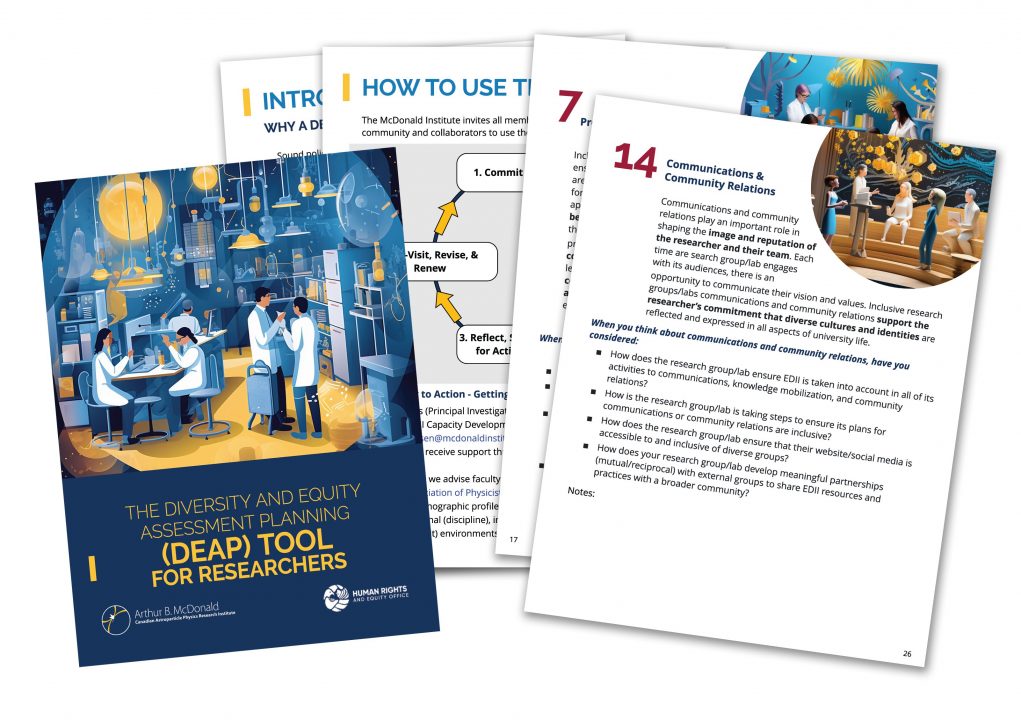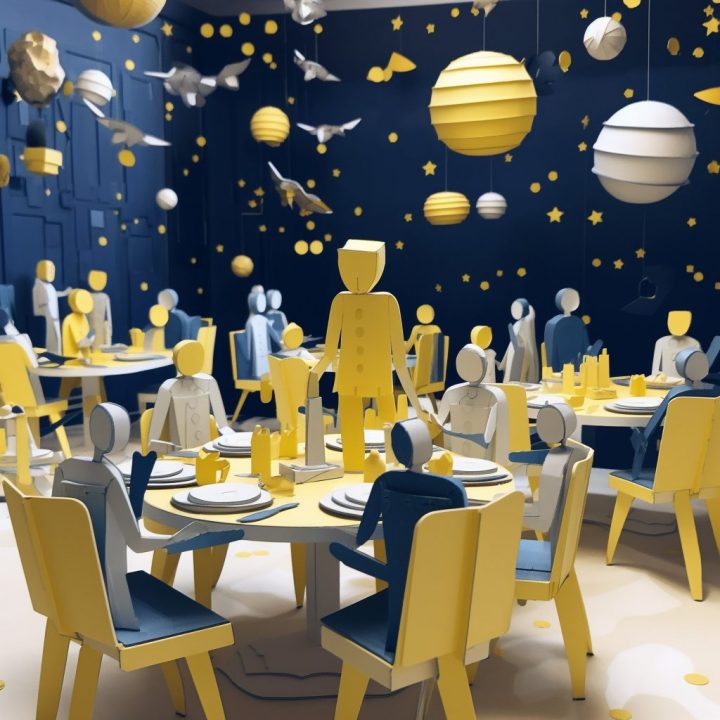Equity, Diversity, Inclusion, and Indigenization (EDII)
What’s on this page:
EDII at the McDonald Institute
The DEAP Tool for Researchers
The Advancing EDII Fund for Astroparticle Physics
Other EDII initiatives:
Call for Indigenous Artists
At the McDonald Institute, we are committed to fostering an environment that values and celebrates equity, diversity, inclusion, and Indigenization (EDII) in all aspects of our scientific pursuits. We believe that advancing our understandings of astroparticle physics is best achieved when individuals from diverse backgrounds and perspectives come together to explore the mysteries of the universe. Our commitment to EDII is integral to our mission, vision, and values as a community.
The next 30 years of astroparticle physics will depend on robust and stable communities of hundreds of researchers from many nations. The ability to cultivate and sustain an equitable, diverse, and inclusive research environment is necessary to maintain scientific excellence in the field as project durations evolve toward multi-decade timescales.
Where have we been...
It is documented that the Canadian physics community has performed below the STEM average for equitable, diverse, and inclusive recruiting, retention, promotion, and operational processes (CanPhysCounts 2021; with additional U.S. context from: Merner and Tyler, 2017; Multimessenger Diversity Network et al. 2020; Porter and Ivie, 2019; National Center for Science and Engineering Statistics Directorate for Social, Behavioral and Economic Sciences, 2018).
External and internal systemic barriers, and biases (conscious and/or unconscious) limited recruitment, participation, retention, and promotion of individuals from equity deserving groups. But, physics is changing…
What are we doing?
The McDonald Institute aims to co-develop, support, and improve day-to-day operational standards of EDII practice for scientists that will sustain long-term research excellence and contribute to a shift in culture, primarily by developing and modifying processes (ways of doing things in research). As a coordinating centre for astroparticle physics research across many university campuses acting in cooperation with major facilities partners, we have:
- Established EDII requirements on our major funding support programs for researchers.
- Established caregiver support for our major meetings. This addresses barriers to participation in career-impactful networking opportunities.
- Provided formalized training through the Professional Development and Learning Series on introductory topics of EDII, such as anti-racism, accessibility, unconscious bias, conversations on decolonization and more.
- Co-developed an equity assessment and planning tool with Queen’s University Human Rights and Equity Office that is useable by individual researchers in academic research groups and labs across our network.
- Created an Indigenous Protocols document for the community to engage with different ways of knowing and learning in collaboration with Indigenous partners.
- Promote opportunities for Indigenous and Black students in STEM by supporting our partners and collaborating with leaders for Indigenization and anti-racism in astroparticle physics and related disciplines.
- We’re getting support on “wise practices” [formerly best practices] from experts from social sciences, psychology, education, and pedagogy.
- Hired a staff member to oversee a yearly EDII budget and programming to bolster community capacity and action.
Where are we going....
We still have a long way to go in creating an inclusive culture within astroparticle physics, but the community is making progress. We believe we have an incredible opportunity in Canada to model a large-scale frontier-science ecosystem that will sustain our long-term work. We’re open to continuous change and improvement in an effort to strengthen the astroparticle physics community and therefore strengthen the scientific community in Canada.
As we move forward, the McDonald Institute recognizes:
- That in positions of privilege and power, the onus of care resides with that position to cultivate a sense of belonging.
- That our unconscious bias can limit our abilities to see or dismantle barriers for others (and it is our responsibility to be self-aware and eliminate our biases to the best of our abilities).
- There is a need to be accountable to actively self-educate on barriers to belonging, to reduce the burden on equity-deserving individuals.
- That any work or learning where there is no lived experience must first seek to include those who possess this knowledge; “Nothing about us without us.”
- That any work or learning where the community asks for engagement with equity-deserving individuals, must be reciprocal; their contribution needs to be met in a way that is meaningful to them.
- That Indigenous ways of knowing and Indigenous Science are of equal value to western scientific models; decolonizing the discipline can move us towards this recognition.
- The need to take advantage of, but not rely on, professional EDII training that develops awareness and education. The landscape of EDII is always evolving, and it is our collective responsibility to champion change.
- The need to address sexual violence and harassment to foster safe and healthy work, learning, and research environments.
- The impact that everyday actions can have on anti-oppression, anti-racism, and fostering inclusion (i.e. proper pronoun use, promoting positive space, regularly using meaningful land acknowledgements).
- That disabilities come in visible and invisible forms, and no one person’s disability is the same anothers’.
- Where community members reside in positions of power, space for safely sharing cultures and identities should be created from day one and woven throughout their resulting interactions.
Be part of the change...
As the McDonald Institute’s EDII efforts continue to grow, this website will be updated with programming content and resources to share amongst the community. If you have any thoughts or feedback you’d like to share with us, please contact: Dr. Alexandra Pedersen, Manager for EDII Capacity Development (alexandra.pedersen@mcdonaldinstitute.ca).

The Diversity and Equity Assessment Planning (DEAP) Tool for Researchers
The DEAP Tool for Researchers was co-developed by the Human Rights and Equity Office at Queen’s University and the McDonald Institute. This Tool is intended for faculty and research scientists to use in their labs or research group spaces to expand their capacity for EDII growth.
The DEAP Tool for Researchers is a living document that will be updated to reflect user experiences as well as an evolving EDII landscape.

The Advancing EDII Fund for Astroparticle Physics
The Advancing EDII Fund for Astroparticle Physics aims to financially support community building and strengthening efforts in physics training and research environments across Canada.
